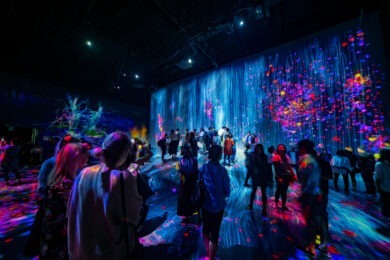It’s 2023, and we’re still talking about a lack of accessibility in the events industry.
From an absence of diverse panel speakers to a lack of options for those visually or hearing impaired, events still aren’t catering to everyone. And we’re not just talking about providing wheelchair access either, something which is also quite low in the industry.

In a world that offers on-site, online and hybrid events, how is this even possible? Especially when technologies such as closed captions and audio guides can easily help those who would previously have found events hard to access.
Lack of planning and understanding audience needs can hinder event attendances. With over 1.8 billion people with disabilities globally, organizations and events that don’t cater to them are not only risking backlash, but they’re also limiting their potential audience reach.
Why Is Event Accessibility Still an Issue?
Despite technological advancements and increased awareness, the events industry still has a considerable distance to cover when it comes to accessibility. Organizers may lack familiarity with the challenges faced by people with health conditions or impairments, resulting in a lack of necessary accommodations.
Read More: 5 Tips for Improving Accessibility for Meetings
Accessibility is a multifaceted issue. It involves a vast range of requirements and needs, from barrier-free venue access to audiovisual aids and sign language interpretation and it can be a challenging task, especially for events with limited resources.
Cultural barriers and biases may also impede organizers from comprehending the importance of accessibility, leading to inadequate arrangements.
Additionally, events that are not accessible to all often result in reduced revenue from ticket sales and sponsorship, limiting the potential for economic growth and innovation. The lack of diversity and cultural exchange hinders progress and reinforces systemic inequalities. By excluding people from different backgrounds and perspectives, we miss valuable opportunities to learn from individuals hailing from all corners of the world and walks of life.
Improving Accessibility in the Events Industry
Accessibility is a critical aspect of event planning that ensures all attendees can fully participate in and enjoy the event experience. But what can event organizers do today to make their events more open and accessible to all?
On-site accessibility: Ensuring the event venue is accessible and inclusive, with features such as wheelchair ramps, accessible seating and braille signage, can make a big difference in enabling disabled people to attend and participate.
Inclusive/diverse marketing: Ensuring that marketing materials and event information are accessible and inclusive can help attract a wider range of attendees from around the world which helps to communicate the event’s commitment to accessibility and inclusivity.
Assistive technology: Offering assistive technology such as hearing aids, amplification devices or mobility aids can help attendees with impairments fully participate in the event. By providing assistive technology, event organizers can create a more inclusive environment that allows disabled people to fully engage with the event and participate in all aspects of it.
Language services: Providing translation or interpretation services can help overcome language barriers for attendees who do not speak the event’s primary language. This can include professional interpreters or even AI-translated speech, that can be accessed via the attendee’s own mobile phones.
Read More: Language Interpretation Is the Next Wave in Virtual Meetings
Captions and subtitles: For attendees with hearing impairments or who are deaf, providing live captions or subtitles throughout your event can make a significant difference. On-stage screens with live captioning or via their mobile phones are two possible ways of making them available.
Flexible attendance options: Offering virtual attendance options, such as live streaming or video conferencing, can provide an alternative for attendees who cannot physically attend the event due to location or accessibility barriers.
The Future of Events
For current and future events, it is essential that event organizers prioritize accessibility and inclusivity to ensure that everyone can participate and benefit from the event.
By implementing strategies such as those listed above, event organizers can ensure that tomorrow’s events are more accessible and welcoming for all attendees. As technology advances, it is only right that events do as well, and creating an awareness of the importance of inclusivity and acting upon it will help shape the way events are planned and executed in the future.
This can ultimately lead to increased attendance and engagement, as well as a positive reputation for the event and its organizers. Therefore, it is important for event organizers to continuously educate themselves and explore new ways to make their events more accessible and inclusive for all.
By embracing accessibility and inclusivity, event organisers can not only enhance the overall attendee experience, but also demonstrate their commitment to diversity and social responsibility.
—
Oddmund Braaten, CEO at multilingual meeting technology and services provider Interprefy.




